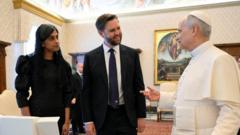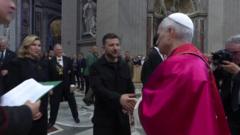In a historic twist for the papal election tradition, online prediction markets are now taking bets on who will succeed Pope Francis as the next leader of the Catholic Church, with Cardinal Pietro Parolin of Italy emerging as the frontrunner. Throughout history, betting on papal elections has been documented as far back as 1503, but this is the first time major online platforms fully embrace the mystery surrounding the Vatican's selection of its leaders.
**Online Betting Markets Take Aim at Papal Conclave: Cardinal Parolin the Early Front-Runner**

**Online Betting Markets Take Aim at Papal Conclave: Cardinal Parolin the Early Front-Runner**
As the Vatican prepares for its highly secretive conclave, online oddsmakers have turned their focus to betting on the next pope, revealing significant stakes in an unpredictable electoral process.
As of early Wednesday, the stakes were high, with wagers pouring into platforms like Polymarket and Kalshi. Despite concerns about Cardinal Parolin's health, the odds remain firmly in his favor, followed by Cardinal Luis Antonio Tagle of the Philippines and Cardinal Matteo Zuppi of Italy. Experts are cautious, however, acknowledging the complexities that define conclave politics, often deemed the “hardest vote on the planet to forecast.”
Rajiv Sethi, an economist specializing in prediction markets, points out that the private nature of conclaves severely limits the information available to bettors. Unlike more public elections, which offer various data points for analysis, the closed-door proceedings of the conclave leave much to speculation. Even seasoned Vatican observers admit that past favorites have sometimes been overshadowed by unexpected outcomes, exemplified by Pope Francis’s ascension in 2013.
While the anticipation builds and bets exceed $27 million, both analysts and bettors are reminded that moments inside the conclave can swiftly alter the course of history, making it nearly impossible to predict the next pope accurately.
Bernhard Warner is a senior editor at DealBook, and Michael J. de la Merced has been reporting on global finance since 2006, covering significant stories and trends within various aspects of the economy.
Rajiv Sethi, an economist specializing in prediction markets, points out that the private nature of conclaves severely limits the information available to bettors. Unlike more public elections, which offer various data points for analysis, the closed-door proceedings of the conclave leave much to speculation. Even seasoned Vatican observers admit that past favorites have sometimes been overshadowed by unexpected outcomes, exemplified by Pope Francis’s ascension in 2013.
While the anticipation builds and bets exceed $27 million, both analysts and bettors are reminded that moments inside the conclave can swiftly alter the course of history, making it nearly impossible to predict the next pope accurately.
Bernhard Warner is a senior editor at DealBook, and Michael J. de la Merced has been reporting on global finance since 2006, covering significant stories and trends within various aspects of the economy.




















